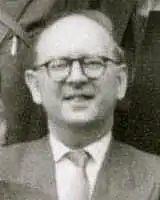Léon Rosenfeld
Léon Rosenfeld (French: [ʁɔzɛnfɛld]; 14 August 1904 in Charleroi – 23 March 1974[1]) was a Belgian physicist and Marxist.

Rosenfeld was born into a secular Jewish family. He was a polyglot who knew eight or nine languages and was fluent in at least five of them.[2]
Rosenfeld obtained a PhD at the University of Liège in 1926, and he was a close collaborator of the physicist Niels Bohr. He did early work in quantum electrodynamics that predates by two decades the work by Dirac and Bergmann.[3] Rosenfeld contributed to a wide range of physics fields, from statistical physics and quantum field theory to astrophysics.[2] Along with Frederik Belinfante, he derived the Belinfante-Rosenfeld stress-energy tensor. He also founded the journal Nuclear Physics and coined the term lepton.[4]
In 1933, Rosenfeld married Dr. Yvonne Cambresier, who was one of the first women to obtain a Physics PhD from a European university. They had a daughter, Andrée Rosenfeld (1934–2008) and a son, Jean Rosenfeld.[5]
Awards and honors
Rosenfeld held chairs at multiple universities: Liège, Utrecht, Manchester, and Copenhagen.[2]
In 1949 Léon Rosenfeld was awarded the Francqui Prize for Exact Sciences.[2]
References
- Léon Rosenfeld's Marxist defense of complementarity, by Anja Skaar Jacobsen "Archived copy" (PDF). Archived from the original (PDF) on 17 July 2011. Retrieved 17 July 2011.CS1 maint: archived copy as title (link)
- Jacobsen, Anja Skaar (2012). Léon Rosenfeld: Physics, Philosophy, and Politics in the Twentieth Century. doi:10.1142/7776. ISBN 978-981-4307-81-9.
- Leon Rosenfeld and the challenge of the vanishing momentum in quantum electrodynamics, by Donald Salisbury
- Rosenfeld, Léon (1948). Nuclear Forces. Interscience Publishers, New York, xvii.
- Smith, Claire. "Andree Jeanne Rosenfeld (1934–2008)". Retrieved 28 November 2015.
External links
 Media related to Léon Rosenfeld at Wikimedia Commons
Media related to Léon Rosenfeld at Wikimedia Commons- Transcript of an interview with Rosenfeld